Interview with Thurston Moore by Ryosuke Nagaoka(PETROLZ)

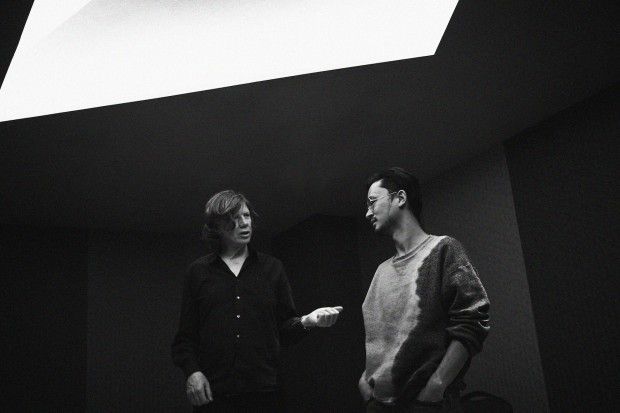
絹糸のような雨が降る東京のとある日。5枚目のソロ作品『Rock N Roll Consciousness』をリリースしたソニック・ユースのサーストン・ムーアと、ペトロールズの長岡亮介が出会った。穏やかな時間が流れるなかで交わされた二人の対話、その記録。
長岡亮介「これが、僕が組んでいるバンド、ペトロールズの1stアルバム(『Renaissance』)です。一昨年、結成10周年のときにリリースしたんです」
サーストン・ムーア「10年目で!? なぜそこまでリリースしなかったの?」
長岡「なかなかタイミングがなくて(笑)。でも、数曲入りの作品はたまにリリースしてました」
サーストン「(三角形の)ジャケットもクールだね。壁にかけたくなるね」
長岡「レコード屋さんに発送して到着するまでに角が折れてしまうこともあって(笑)」
サーストン「なるほどね(笑)。楽しみに聴かせてもらうよ。メンバーは何人?」
長岡「トリオです。僕はギターを弾きながら歌ってます。こっちはソロで出した作品(『MIXED MESSAGE』)です」
サーストン「どういうサウンドを鳴らしてるの?」
長岡「ソロはフィーリングに任せて思いつきでギターを鳴らしながらGarageBandで作りました。バンドのほうはよくあるトリオみたいな音楽性にはしたくなくて。強いて言えばブラックミュージックの要素がけっこう入ってるかな。でも、音の隙間はすごく多いんです」
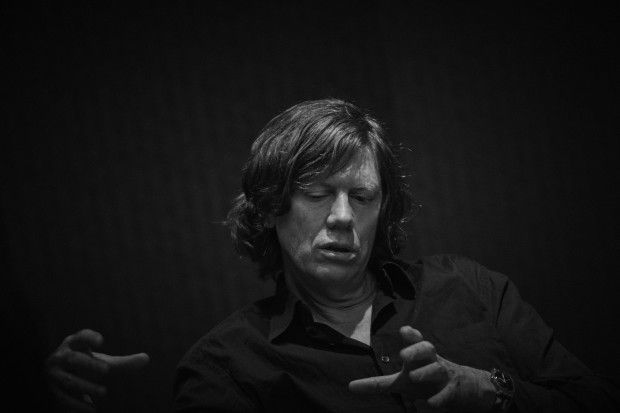
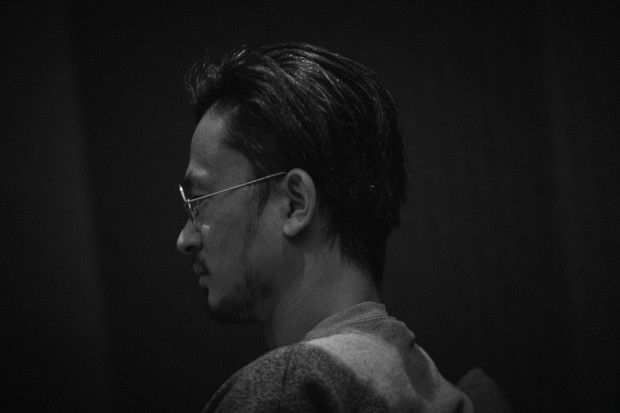
サーストン「君のルーツはどういう音楽なの?」
長岡「父がブルーグラスのバンドをやっていたんです。その影響でカントリーやブルーグラスを子どものころから聴いてました」
サーストン「いいね。僕は若いころアラバマに住んでいたことがあって。アラバマはカントリーやブルースが盛んなエリアだから、自然と耳に入っていた。60年代、70年代のアメリカを知っている者としては、ジョニー・キャッシュの存在は大きくて。彼は子どものころから重要なシンガーだった。でも、自分でカントリーをやろうと思ったことはないなぁ」
長岡「カントリーって日本だと演歌みたいな感じなのかな」
サーストン「カントリーはヒップな音楽だと捉えていたかな。フライング・ブリトー・ブラザーズやボブ・ディランもカントリーにフォーカスを絞っていた時期があったし。人種差別的なアメリカの音楽文化と結びついたところもあったから、それで抵抗を感じてる人もいるかもしれない。でも、どんなジャンルの音楽にもそういう側面はあるからね。日本の演歌のミュージシャンが使ってるギターってどういう感じなの?」
長岡「クラシックギターが多いのかな?」
サーストン「あの、三弦の……」
長岡「三味線だ(笑)」
サーストン「そう、三味線は演歌では使わないの?」
長岡「民謡に近い曲ではあるかもしれないけど、主には使われてないと思いますね。たとえばポップスの曲にシタールを入れるみたいにエッセンスとして弾かれることはあるかもしれないけど」
サーストン「三味線っておもしろそうだよね」
長岡「あなたが弾いてるのを見てみたい。ノイジーに(笑)」
サーストン「それ言おうと思ったんだ(笑)。三味線にエフェクターを繋げてね。“ノイズ演歌”とかあるのかな?」
長岡「僕が知らないだけで日本のどこかにあるかも(笑)」
サーストン「やってみようかな(笑)。君の出身は東京なの?」
長岡「千葉という東京の隣にある街なんです」
サーストン「じゃあシティボーイだね」
長岡「そんなことないです(笑)。あなたの今のお住いはロンドンですよね?」
サーストン「そう」
長岡「車は乗ってますか?」
サーストン「ロンドンでは乗ってなくて。自転車に乗ってるよ」
長岡「いいですね。僕は車も自転車も好きです」
サーストン「僕も車と自転車は大好きだよ。初めて自分で車を買ったのは30代後半のとき、95年だった。子どもが生まれてから買ったんだ。19歳からニューヨークに住んでいたから必要なかったんだよね。地下鉄に乗ればいいし、車を買うお金もなかったしね(笑)。ニューヨークに行く前は(自宅の)ビートルに身を屈めて乗ってたよ(笑)」
長岡「ああ、身体が大きいから。自転車も大きくなきゃね(笑)」
サーストン「もう、ユニサイクリング(一輪車)でもいいかなと思ってる(笑)。でも、ロンドンは自転車も乗りづらい街だよ。電気自動車にも興味ある?」
長岡「あまりないかな。でも、デロリアンの電気自動車があるみたいで、それはちょっと乗ってみたいかな。もともと古い車が好きなんです」
サーストン「ビンテージの英国車もいいよ。ニューヨークにいるとよく雨が降るし、ビンテージカーがすぐ台無しになってしまうんだよね。でも、カルフォルニアに行くと素敵なビンテージカーがたくさんあって、ジェラシーを覚えたくらい。アメリカには行ったことある?」
長岡「それがないんです。中学生のときにアラスカには少しだけ行ったことがあるんだけど(笑)。アメリカにもちゃんと行ってみたいですね。ロンドンには半年くらい滞在したことがあるんです」
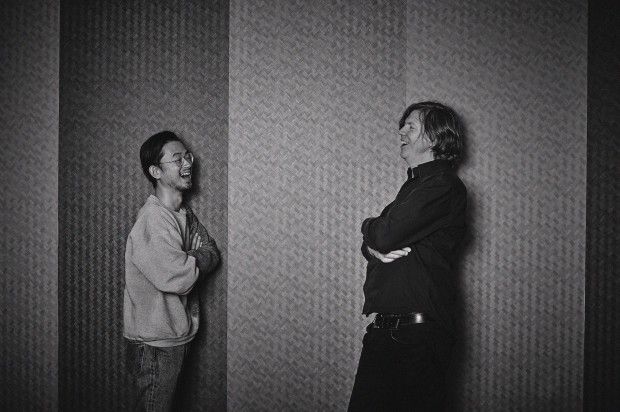
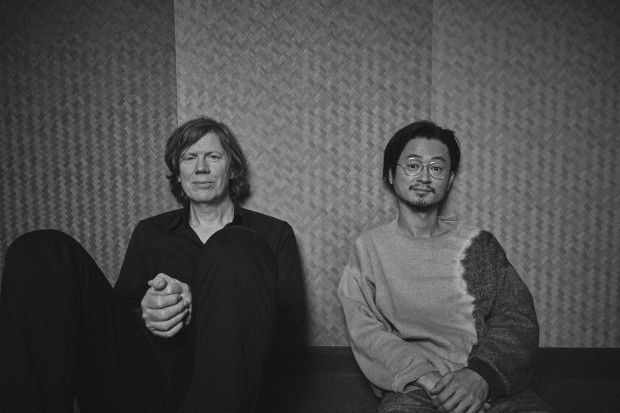
サーストン「そうなんだ。ロンドンはどう感じた?」
長岡「曲を作ろうと思ってギターを持って行ったんだけど、あまり集中できなかった(笑)。カムデンの語学学校にも行って。ロンドンは居心地いいですか?」
サーストン「どこかよそ者的な感覚はあるけど、今となってはニューヨークにいたときと同じ感覚かな。将来的にはニューヨークもロンドンも関係なく、地球という感覚で住んでいければいいな。今の政治的な概念って国で分け隔てるじゃない? 僕はそれと正反対の考えを持ってるから」
長岡「あなたのニューアルバム(『ロックンロール・コンシャスネス』)はロンドンでレコーディングしたんですか?」
サーストン「ロンドンの教会を改築したスタジオでレコーディングして、シアトルでミックスしたんだ。だから、二つの場所のフィーリングが融合した作品になってると思う。それは最初から目指していたことで。僕がロンドンで好きな場所と、僕にとって重要なシアトルのロックシーンの歴史を結び合わせたかったんだ」
長岡「教会だったスタジオでレコーディングするなんて素敵ですね」
サーストン「そのスタジオの名前は“ザ・チャーチ”というんだけど、とても大きくて美しい場所だよ」
長岡「あなたの音楽にはノイズのインプロパートがあるじゃないですか。あれって意図してできるものじゃないですよね。きっと奇跡みたいな瞬間なんだと思うんですけど」
サーストン「ノイズミュージックをずっとやってきているけど、僕としてはその瞬間に曲作りをやっているような感覚なんだ。フリーインプロビゼーションには60年代から世界中にいろんな流派があって。たとえばオランダにはICPというフリージャズのレーベルがある。そこの考え方は、フリーインプロにはソロだろうが、デュオだろうが、トリオだろうが、あるいはもっと大所帯の編成だろうが、そこにいるすべてのミュージシャンのヒエラルキーが平等で、演奏の上手い、下手も関係ないというもので。音量にしたってそう。そこに上下関係はない。リーダー不在でそこにいるミュージシャンだけで音楽を作る。だから、ジャムとは違うんだよね」
長岡「ああ、ジャムではないんですね。その違いはとても大きいんでしょうね」
サーストン「そう、僕はフリーインプロの感覚が好きなんだ。ミュージシャン全員が平等であることが好きと言ってもいい」
長岡「たとえばフリーインプロで録音しているときに『いや、こうじゃないんだよな』って違和感を覚えることはないですか?」
サーストン「もちろんあるよ。でも、その瞬間はそれでOKなんだ。ライブを重ねるうちにどんどんしっくりくるようになっていくしね。最終的に自己満足だけで終わらないことがポイントになってくると思う。エゴを忘れることが大事なのかなって思うんだ」
長岡「ああ、エゴを忘れるか。なるほど、あなたの即興の素晴らしさを知りたかったんだけど、そういうポイントがあると知れてよかったな」
photography Junko Yoda
interview & text Shoichi Miyake
edit Ryoko Kuwahara
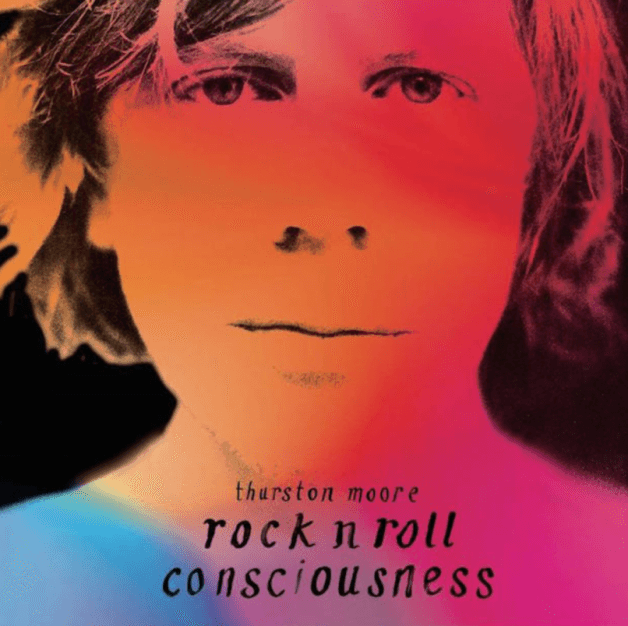
Thurston Moore
『Rock N Consciousness』
(Ecstanic Peace library / Hostess)
発売中
itunes
amazon
Hostess Club Presents… Thurston Moore Group
2017/9/19(火)大阪・梅田Club Quattro
2017/9/20(水)愛知・名古屋Club Quattro
2017/9/21(木)東京・恵比寿Liquidroom
Open 18:00 / Start 19:00
チケット:¥7,500(税込・1 Drink別途)
公演official site:http://ynos.tv/hostessclub/schedule/20170919-0921.html
Thurston Moore
ニルヴァーナやダイナソーJrと並びUSオルタナ黄金時代を代表するバンド、ソニック・ユースのフロントマンとして83~11年の間に通算16枚の公式スタジオ・アルバムを発表。ソロで4枚のスタジオ・アルバムと多数のセッション/実験作を発表。12年11月に開催した第3回ホステス・クラブ・ウィークエンダーではヘッドライナーを務めた。13年に新バンド、チェルシー・ライト・ムーヴィングを結成しアルバムを発表。2014年10月、ソロとしては3年半振りとなるアルバム『ザ・ベスト・デイ』をリリース。2017年4月に新アルバム『ロックンロール・コンシャスネス』をリリースした。
https://www.thurstonmoore.com/
長岡亮介(ペトロールズ)
長岡亮介、三浦淳悟、そして河村俊秀の3人組。クルマ好きの長岡が英国でガソリンを意味するペトロールという言葉をグループ名に冠して2005年に結成。ひとつひとつの音が消える瞬間までを意識下に置いたその演奏は人々の集中力を引き付ける。一捻りされた催しなどでリスナーとの信頼関係を築き続け、愛好家は着実に増え続けている。 5枚(※1)の作品をリリース。
(※1) 1.「MUSIC FOUND BY HDR-HC3」ライヴ記録用のビデオカメラHDR-HC3によって収録されたライヴコンセプトアルバム。2008年リリース。現在品切れ。
2.「EVE2009」12月31日にリリースされた初スタジオレコーディングによるミニアルバム 2008年リリース。現在品切れ。
3.「amber」代官山UNITでの単独公演を記念して制作されたシングルCD 2009年リリース。現在品切れ。
4.「idol」ライヴ会場のみで発売しているシングルCD 2010年リリース。現在品切れ。
5.「capture 419」2012年のペトロールズをキャプチャーした従来のライヴ版を逸脱したライヴコンセプトアルバム。 2012年リリース。ライブ会場・JET SETにて販売中。
9月12日(火)東京・新木場スタジオコーストを皮切りにツアー「BASE-12 Ⅱ」をスタート。
http://www.petrolz.jp
http://twitter.com/#!/thepetrolz

– “Petrolz” is the name of our band, and this is the first whole album we’ve put out last year. This is our tenth year, and this is our first ever record.
TM: Really? After ten years? Why did it take so long?
– We didn’t have a chance to.
TM: Oh, really.
– We did EPs and stuff like that. We’re really faithful to the art as creators so we just wanted to find the right timing.As you can see, it did not fit in a CD shop.
TM: Yeah, you have to lean it against the wall.
-W e got a lot of returns because of that, since it got damaged.
TM: Do you have a vinyl?
– For some of our stuff.
TM: That’s really cool. I’m looking forward to hearing it.
– Please.
TM:Wow.
– It’s a three piece band, by the way. The guitar player and singer makes most of the songs.
TM: That’s what you call a power trio.
– You call it that way?
TM: Like the ZZ Talk.
– But I’m from country music area, originally. My father was a bluegrass musician.
TM: Oh really, fantastic!
– Have gone through with that area at all? Country and bluegrass.
TM: Country music? Living in the USA, you’re very aware of the country music. I used spend a lot of time my youth in Alabama, which is part of the states that is very much of a country and blues area. So yeah, but I’ve never thought of myself working in that industry. When you’re growing up in the USA, in the sixties and the seventies, you’re very aware of like Johnny Cash,. Johnny Cash was really important to me, as a child.
– In Japan we have this thing called “enka”, have you of that before?
TM: Yes.
– When I was younger, i was not into “enka” at all, but how was it? I mean when you were younger, what did you think of country music?
TM: Well, I thought country music was really hip because when I was younger you had bands like the Burrito Brothers, and they made country music really hip for the hippie generation. Bob Dylan made a record that was focused on country music. John Wesley Harding as well. So, the idea of country music was later called Americana. It was considered to be kind of hip because it was genuine people’s music. But some people had issues with country music because it related to possible connections to a racist America. So, it was slightly problematic for some people in the aspect. But I think all genres of music have the factors where people use for their own devious concerns. Even punk rock had a horrible area of it that was dealing with nastier things. In the heavy metal as well. But you know, we just stay away from those kind of people.
– It’s great that I have my own gig at the country house in Akasaka, which is where all the country music lovers get together and drink and listen to the country music.
TM: But this music you’re doing solo here is not country?
– It’ s not country at all.
TM:What kind of music is it?
– This was quite derivational. I put this garage band together. This one, I didn’t want to make it like a regular trio band so it has a bit of black music image, and very scarce sound-wise.
TM: Cool. What is the guitar that “enka” musicians use?
– Classical guitar!
TM: Three strings?
– Shamisen? That’s more for like Japanese folk music.
TM: You don’t use that in enka?
– Enka has four key elements to it so they don’t really use it. Sometimes they corporate it in it as an essence onto the guitar, like some pop musicians in America incorporate stall into their guitar. So you know shamisen? Do you have one?
TM: No, no.
– I’d love to see you playing the shamisen. It might be noisy.
TM: Is there a noise enka scene?
– Maybe. There might be. Maybe there’s somebody who’s doing something like that very underground. I love automobiles, bicycles, and music is one thing but I likes basketball and stuff. That’s why I called our band because those automobiles seemed be a big inspiration for me to create music. Do you share that interest?
TM:Well, I really love Japanese crown cars. We don’t have these in the USA. When you watch seventies police shows, those cop cars are called crown victorias, but I don’t know if it’s the same r as the crown that makes all the taxis in Tokyo. Those are cool. Those little crown taxi cars. That’s what I want. I want one of those. Do I love cars and bicycles? Yeah. I didn’t own a car until I was 1995. That was like my late thirties. I moved to New York City when I was nineteen, and you don’t need a car there. I just rode subways. I couldn’t afford a car. I didn’t really buy a car until my daughter was born. When I was a teenager I had volks wagon beetle. That was cool. Tall people are not the best to fit in them.
– Do you live in London?
TM: I don’t own a car in London either. I have a bicycle.
– You need a big one right?
TM: Yeah. I need to get a unicycle. But London isn’t that good for bicycles. It’s not built for bicycles. They’re trying to make more friendly for bicycles though. Is Tokyo good for bicycles?
– Yeah. It’s good.
TM: But I love bicycles.What about electric cars?
– I’m personally not very interested in electric cars. But do you know the delorean ones? That’s available as electric car. He’s like maybe it’ll be good. There’s some cars in England that I really love. Really vintage, great, and beautiful. Where I lived in America, it snowed so much it destroyed vintage cars. When I first went to California, I saw these beautiful vintage cars I was really jealous, but you can’t have them on the east coast because they get destroyed by the weather. Have you been to America?
– No, he’s been to Alaska though.
TM: I’ve never been to Alaska. Why would you go to Alaska?
– I had a friend in my school that his father was working for JAL, the airline company, and if you remember JAL. Since they were working at JAL they all had a place to stay in Anchorage.
TM: Oh, that must have been amazing.
– So, he had a chance to stay with them. That was when he was in junior high school. Long time ago. I’d love to go to the states. Why are you laughing? Would you not recommend him to go to the states?
TM: Right now it’s kind of frightening because it’s gotten all taken over by this horrible beast. He’s really offensive, you know.
– Do you feel much more comfortable in London?
TM: I feel slightly alien. I feel like right now, I could live anywhere. I think that maybe the future needs to be less borders and more planetary anyways. My thinking is really complete opposition to contemporary locals. Last time I was in Tokyo, there was a punk protest going on in Harajuku on the streets. It was great. There were people holding signs saying “no borders”. So great. It was like this crazy punk bands that were playing. It was really cool. I have pictures of it.
– That’s nice.
TM: That was really cool.
– Have you ever wished to stay in a foreign city for like a while? I was actually in London for about half an year, and brought my guitar with me thinking that I could write some songs but I couldn’t really focus on it. So many things to see.
TM: Where were you staying at?
– First, Edgware road. But within London, and went to school. Also, doesn’t the guy on the guitar, James, have stickers on his guitar that has Japanese writings on it?
TM: Oh, I put those on there. A long time ago. Big ten years ago. I found them at Tokyu hands. I didn’t know what they said, but somebody said they’re some crazy saying.
– He didn’t actually figure out what was actually written, but do you know?
TM: Somebody’s father really laughed, and said that it’s something that old men yell at each other or something. I just thought they looked nice. Sometimes I see kanji, and I’ll buy and have no idea what it says. Sometimes it gets me in trouble. Sometimes you see English words in Japan that say things that are slightly kind of off from the actual English phrase, and it’s really cool.
– So I listened to the new album, and it sounded really refreshing.
TM: The album, thank you.
-He wanders if the city of London’s relaxed feelings had to do with that.
TM: Yeah, it has a ot to do with living in London I think, environmentally. I think it’s a very London centralized record, but at the same time I took the recording that I did at the church and I took it to Seattle, and I mixed it in Seattle. So, it has these two connections between London and Seattle. So that’s kind of what I was trying to do. Connect what I love about London, and what I kind of loved about the USA, which is sort of the history I have from the Seattle scene.
– In the church?
TM: It’s a big beautiful church.
– Where in London?
TM: Crouch end.
– Which side of the city?
TM: I think it’s considered north of London. Yeah, because I live in Stoke Newington.
London’s crazy. I like it. I wish I could spend time at all these places. Everytime I go to a city I fall in love with it. Did you grow up in Tokyo?
– Chiba, nearby prefecture.
TM: So you’ve always been a city boy?
– Not that urban. The improvisational part with the noise? Those things just happen right? Rather than trying to make something like that. It’s more like a happening yeah?
TM: I always think of playing free improvised music, where you’re creating a composition in the moment. It’s truly a spontaneous composition. Because it’s free in improvisation and players have existed since the sixties who have different schools from around the world. There’s once in Holland called ICP, which mean instant composers pool. There idea was that when you’re in free of provocation, in a solo or a duo or a trio, there’s no hierarchy. Everybody’s in the same value. If you can’t hear everybody, and then you’re playing too low. There’s no leader. You’re basically creating a composition in real time, so you have a beginning, you have a body, and it’s not jamming. As much as I would love that. It’s not that. So I really like that sensibility, of provocation. There a real connection between the English, the European, and the Japanese models. So we always hear about people like Takanagi or Kawabe. Those people that are really significant and important like free improvised musicians. Those people like Wasabi, that was like a fetishisation of free improvisation. When I play free improvisation, it’s going to be this piece of music created in real time, with a structure that magically defines itself. I find it really informs ideas towards songwriting. I constantly think that that’s something that I would love to employ into a song structure.
– When you’re writing or recording big noise parts, does it sometimes go to the point where you go like maybe this is too much, or this is not what I wanted?
TM: Yeah, some sections in a song, or free improvising in a song. Initially it’s very contained. And then, when start playing it live, it becomes more expensive. Then you start realising that it’s kind of maybe polarising some of the audience. So, I try not to get it become a self-indulgent. In a way, it’s easy to be self-indulgent, try to transcend it by doing selflessness or egolessness.
– I’m just curious because it’s all improvised and is a moment thing, but at the same time it’s constructed.
TM: Well, Sonic Youth was always about bringing these ideas together, and not having the idea of being free of improvisation or having an equal value to the composition. But it’s interesting cause sometimes we would do a piece of music where the song is four minutes, and then it has an ending that is fourteen minutes. I had people come up to me saying , “Why do you spend so much time doing this?” And I’m like, “To me, it’s just all sort of a musical world.” A lot of people lose their focus, and find it boring. For me, that’s like more relative to the human condition. Last time I saw Neil Young, he was playing classic songs like “ Cinnamon Girl”, and then he would just go ten minutes doing feedback. I saw it in a huge arena two or three years ago, and I loved it. At some point, I saw it in front of me, and this gentleman stood up from his seat and started yelling at the stage which was a million miles away, and he was just yelling, “Come on!”. I thought “Oh, he getting angry.” He was yelling, “Fucking stop it. I paid the money, and I’m out here with my date and we want to here Cinnamon Girl, but you keep fucking playing feedback!” It shocked me, just like “Wow.” This is not something that people find any interest in it. It doesn’t stimulate them. Hey want to be massaged by what they know already.

都市で暮らす女性のためのカルチャーWebマガジン。最新ファッションや映画、音楽、 占いなど、創作を刺激する情報を発信。アーティスト連載も多数。
ウェブサイト: http://www.neol.jp/
- ガジェット通信編集部への情報提供はこちら
- 記事内の筆者見解は明示のない限りガジェット通信を代表するものではありません。

